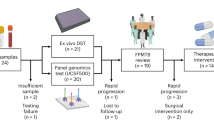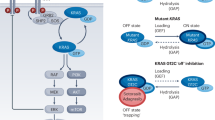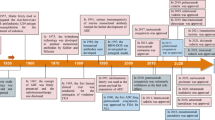This is a preview of subscription content, access via your institution
Access options
Subscribe to this journal
Receive 12 print issues and online access
$259.00 per year
only $21.58 per issue
Buy this article
- Purchase on Springer Link
- Instant access to full article PDF
Prices may be subject to local taxes which are calculated during checkout
Similar content being viewed by others
Data availability
The datasets generated during and/or analyzed during the current study are available from the corresponding author on reasonable request.
Change history
25 May 2023
A Correction to this paper has been published: https://doi.org/10.1038/s41375-023-01927-8
References
Calquence [package insert]. Wilmington, DE: AstraZeneca Pharmaceuticals LP; 2022.
Byrd JC, Harrington B, O’Brien S, Jones JA, Schuh A, Devereux S, et al. Acalabrutinib (ACP-196) in relapsed chronic lymphocytic leukemia. N. Engl J Med. 2016;374:323–32.
Wu J, Zhang M, Liu D. Acalabrutinib (ACP-196): a selective second-generation BTK inhibitor. J Hematol Oncol. 2016;9:1–4.
Bye AP, Unsworth AJ, Desborough MJ, Hildyard CAT, Appleby N, Bruce D, et al. Severe platelet dysfunction in NHL patients receiving ibrutinib is absent in patients receiving acalabrutinib. Blood Adv. 2017;1:2610–23.
Byrd JC, Hillmen P, Ghia P, Kater AP, Chanan-Khan A, Furman RR, et al., editors. Acalabrutinib versus ibrutinib in previously treated chronic lymphocytic leukemia: results of the first randomized phase III trial 2021: American Society of Clinical Oncology (ASCO).
Byrd JC, Wierda WG, Schuh A, Devereux S, Chaves JM, Brown JR, et al. Acalabrutinib monotherapy in patients with relapsed/refractory chronic lymphocytic leukemia: updated phase 2 results. Blood 2020;135:1204–13.
Awan FT, Schuh A, Brown JR, Furman RR, Pagel JM, Hillmen P, et al. Acalabrutinib monotherapy in patients with chronic lymphocytic leukemia who are intolerant to ibrutinib. Blood Adv. 2019;3:1553–62.
Wang M, Rule S, Zinzani PL, Goy A, Casasnovas O, Smith SD, et al. Acalabrutinib in relapsed or refractory mantle cell lymphoma (ACE-LY-004): a single-arm, multicentre, phase 2 trial. Lancet. 2018;391:659–67.
Sharman JP, Egyed M, Jurczak W, Skarbnik A, Pagel JM, Flinn IW, et al. Acalabrutinib with or without obinutuzumab versus chlorambucil and obinutuzumab for treatment-naive chronic lymphocytic leukaemia (ELEVATE-TN): a randomised, controlled, phase 3 trial. Lancet. 2020;395:1278–91.
Schulman S, Angerås U, Bergqvist D, Eriksson B, Lassen M, Fisher W, et al. Definition of major bleeding in clinical investigations of antihemostatic medicinal products in surgical patients. J Thromb Haemost. 2010;8:202–4.
Health UDo, Services H. Common terminology criteria for adverse events v. 5.0. 2017.
Furman RR, Byrd JC, Owen RG, O’Brien SM, Brown JR, Hillmen P, et al. Pooled analysis of safety data from clinical trials evaluating acalabrutinib monotherapy in mature B-cell malignancies. Leukemia 2021;35:3201–11.
Shatzel JJ, Olson SR, Tao DL, McCarty OJ, Danilov AV, DeLoughery TG. Ibrutinib‐associated bleeding: pathogenesis, management and risk reduction strategies. J Thromb Haemost. 2017;15:835–47.
Series J, Garcia C, Levade M, Viaud J, Sié P, Ysebaert L, et al. Differences and similarities in the effects of ibrutinib and acalabrutinib on platelet functions. Haematologica 2019;104:2292.
Acknowledgements
The Biostatistics Shared Resource (BSR) at The Ohio State University Comprehensive Cancer Center, Columbus, OH for biostatistical support of this study. Research reported in this publication was supported by The Ohio State University Comprehensive Cancer Center. ASK is a recipient of the Conquer Cancer, the ASCO Foundation, Career Development Award. KAR and JAW are Scholars in Clinical Research of The Leukemia & Lymphoma Society.
Author information
Authors and Affiliations
Contributions
PSK, AJP, AZ, and LA collected data. PSK, TW, MP, and ASK interpreted data and were involved in the conception and design of the study. PSK and ASK wrote the manuscript, and all authors analyzed the data, edited, and revised the manuscript, provided critical intellectual content, provided patient care, and approved the manuscript.
Corresponding author
Ethics declarations
Competing interests
PSK, TW, LR, AJP, AZ, MP, LA have no conflicts to disclose. SAB receives research funding from AstraZeneca, and has consulted for Pharmacyclics, Janssen, Beigene, and AstraZeneca, and has received honorarium from OncLive, and has received travel funding from Arqule. JCB has consulted for Syndax, Trillium, AstraZeneca, Novartis, Newave and Kronos, and is the chair of the scientific advisory board and a major stockholder in Vincerx Pharma. MRG receives research funding from the Hairy Cell Leukemia Foundation for Patient Data Registry, has consulted AstraZeneca, Pharmacyclics, Ascerta (participant in long-term follow-up Data Safety Monitoring Committee), Axio, Inc; Serono/Merck, has received travel expenses from the Hairy Cell Leukemia Foundation, is the scientific board chair for the Hairy Cell Leukemia Foundation Scientific Board (no reimbursement), and has received scientific honorarium from the University of Pittsburgh. KAR receives research funding from Genentech, AbbVie, Janssen, and Novartis, consults for AbbVie, AstraZeneca, Genentech, Pharmacyclics, Innate Pharma, and Beigene, and received travel funding from AstraZeneca. JAW has received research funding from Janssen, Morphosys, and Schrodinger and has consulted for Abbvie, AstraZeneca, Beigene, Genentech, Janssen, Loxo, Newave, and Pharmacyclics. ASK has received research funding from AstraZeneca, and has consulted for Abbvie, AstraZeneca, Beigene, KITE, and Janssen.
Additional information
Publisher’s note Springer Nature remains neutral with regard to jurisdictional claims in published maps and institutional affiliations.
The original online version of this article was revised: The category of the article was changed to Letter and the layout was adjusted accordingly.
Supplementary information
Rights and permissions
Springer Nature or its licensor (e.g. a society or other partner) holds exclusive rights to this article under a publishing agreement with the author(s) or other rightsholder(s); author self-archiving of the accepted manuscript version of this article is solely governed by the terms of such publishing agreement and applicable law.
About this article
Cite this article
Kumar, P.S., Wiczer, T., Rosen, L. et al. Evaluation of bleeding events in patients receiving acalabrutinib therapy. Leukemia 37, 1554–1557 (2023). https://doi.org/10.1038/s41375-023-01869-1
Received:
Revised:
Accepted:
Published:
Issue Date:
DOI: https://doi.org/10.1038/s41375-023-01869-1
This article is cited by
-
Acalabrutinib/enoxaparin-sodium
Reactions Weekly (2023)



